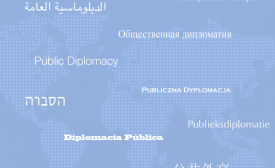public diplomacy
"First and foremost, we want to show people that China is not all about censorship and political debate. People talk about movies, celebrities, social issues and even international news. We explain how Weibo’s used for many other things than just to talk about what people are eating or doing, how it's helping people, how it affects lives, how silly it can be and how it’s not that different from social networks in the West.
While mainstream media often reported on the news of a disaster, citizen journalists were able to provide valuable background information that could impact humanitarian policy. "Reporting a disaster or an emergency is as critical as reporting the events leading to it. How did people react just before it happened and so on," Palatino said.
There are yet others who consider "soft power" a transparent effort to mask U.S. efforts to run the affairs of the world, whether in "hard" or "soft" style. The key value of "soft power" however, was not in its ideological call to anything, nor was it intended to cover up hard intentions or distract with soft-heartedness.
Michael Kahn Ackermann, former President of the Goethe Institute in China and now a senior consultant to the Confucius Institute, says a state's image cannot be built artificially, especially when it concerns culture. Countries naturally want to show their best side to the public, but Ackermann does not think there is any excuse for forming a "perfect" image that hides deficiencies.
Stating that CIKU has been playing an essential role in cultural exchanges and people to people relations by bridging the language barrier, Liang said that Nepalese people have been showing immense enthusiasm to learn the language as a result of which Chinese language has been included in the curriculum of many colleges in Nepal.

In the latest CPD Perspectives paper, titled "Practicing Successful Twitter Public Diplomacy: A model and case study of U.S. efforts in Venezuela," Erika Yepsen examines the role Twitter can play in public diplomacy, and how current policy needs to adapt to enable government to capitalize upon the benefits of the technology to engage effectively online.
Cheap and irresponsible China-bashing is counterproductive to the long-term American strategy because it is sure to inflame Chinese nationalism, a powerful emotional force that could be deftly exploited by the ruling Communist Party. When the Chinese media plays up such anti-China rhetoric coming from America’s most powerful politicians, one can bet that it will elicit instinctive anti-American feelings from ordinary Chinese.
The episode was a reminder not only of the prevalence of the internet even in the world’s failed states, but, more importantly, it underscored how social media might be used as a tool in the conduct of international wars – or in the pursuit of peace.







